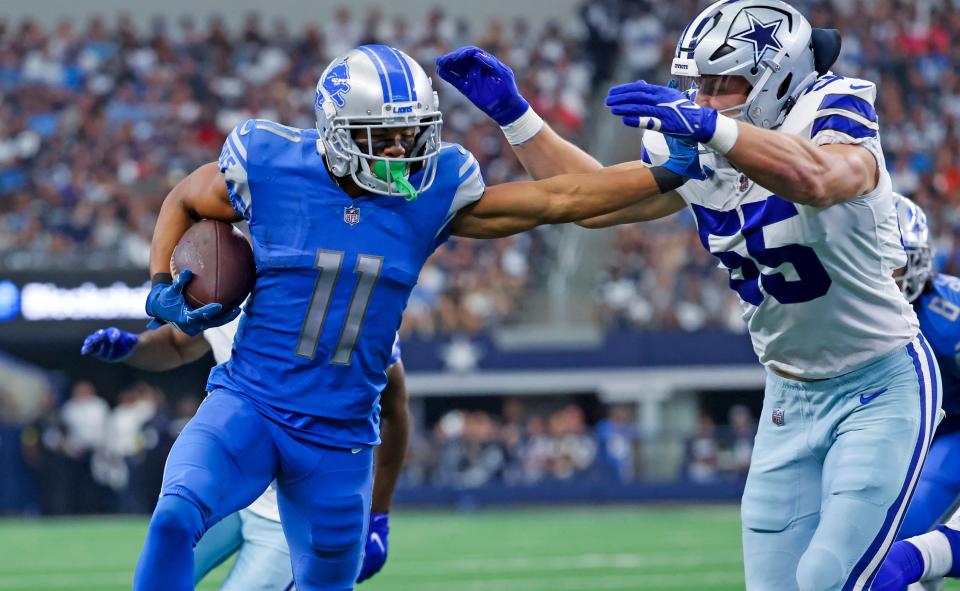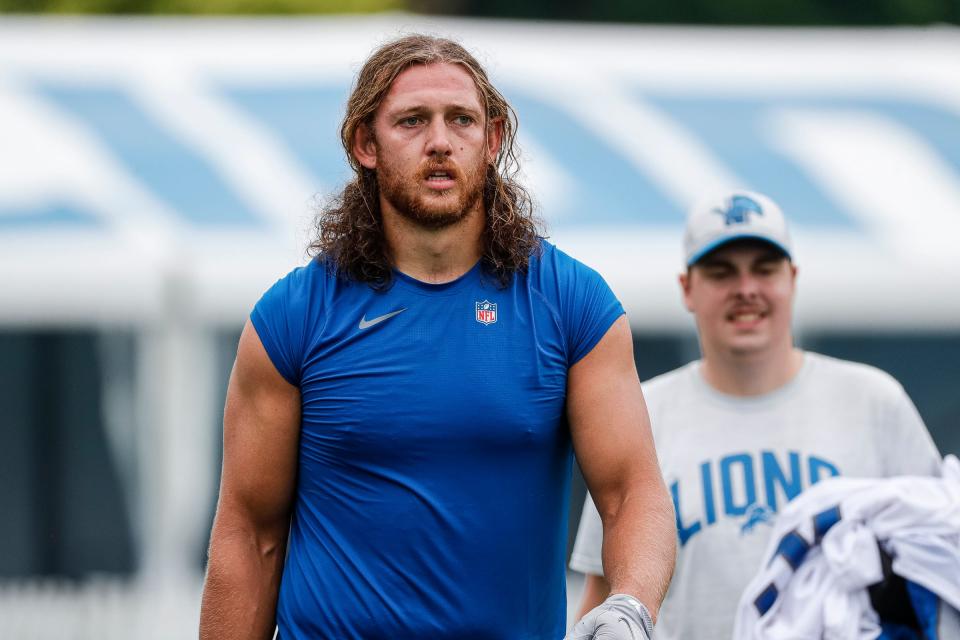How a grass-fed cow, avoiding eating 'for taste' is boosting some Detroit Lions players
One of the first things DeShon Elliott did when he moved to Detroit this summer was put out a call to find a personal chef on Twitter.
Elliott, in his first season as a starting safety with the Detroit Lions after four years with the Baltimore Ravens, had used a private chef on and off during his time in Baltimore and had seen it positively impact his career.
He saved time and money after relying heavily on the food delivery services DoorDash and Uber Eats as a young player. He was able to better maintain a routine; he likes to work out early in the morning and often comes home late in the evening from practice, so having pre-made meals was convenient.
And most importantly, he saw benefits to his health.
Elliott, an aspiring chef in college who plans to attend culinary school when his playing career is over, missed most of the 2019 season with a knee injury and consulted with a nutritionist during his recovery.
He changed his diet to help alleviate the swelling in his knee following surgery, and when he found that worked, he decided to make his new healthy eating habits a permanent lifestyle change.
LIONS VS. DOLPHINS:Dave Birkett's scouting report, prediction

“It took me two years to really realize, ‘Hey bro, you’re not Superman,'" Elliott said. “Things happen to you, you have to take care of your body and it starts with what you eat. You can’t put 83 in a Lamborghini, so you got to get the premium gas in you. That’s all I really know.”
As more and more players look for an edge on the field, they’ve embraced healthier eating to boost their performance and extend their careers.
Lions cornerback Jeff Okudah said he ditched a diet that consisted mostly of Domino’s pizza and Wendy’s chicken nuggets and fries in college, and hired a personal chef when he got to the NFL.
Tight end T.J. Hockenson buys a grass-fed cow from his cousin’s farm and uses the meat to cook meals throughout the year.
Eat the pizza, drink the Kool-Aid.
DeShon Elliott (@OfficialShon_4) serves up wood-fired @BigaloraPizza for me, @Gom1094, & @_TheTB. He opens up about how the @Lions culture brought him to Detroit & how he thinks it can work.
"If it weren't for the culture, I wouldn't be here." pic.twitter.com/cziafh0kW9— Jeanna Trotman (@JeannaTrotmanTV) June 18, 2022
Quarterback Jared Goff said he seriously started using a personal chef three years ago with the Los Angeles Rams and connected with a new cook who is “incredible” in Detroit.
And Elliott said he relies on his chef to cook nearly every meal he eats in-season.
He spends $2,500 a month to have his chef come to his house and prepare his meals for a week. She buys the groceries, cooks and fills his refrigerator with meals packed in small black containers he can pull out and heat up or take on the go.
“It’s 2022, people are starting to realize that like, it’s not about just the now, it’s about later on when you’re older and it starts now,” Elliott said. “Because if you don’t start now, it’s going to be way harder to control yourself when you’re older. And whatever you do now is going to affect your heart, going to affect your body at a later age. Everyone wants to live to see their kids have kids, so I think that’s one of the biggest things.”
'I don’t eat for taste'
Kalif Raymond used a personal chef to help regulate his diet during parts of his three seasons with the Tennessee Titans, but the current Lions receiver was not always fortunate enough to afford such luxury.
As an undrafted rookie with the Denver Broncos in 2016, Raymond maintained the 180-pound weight minimum trainers gave him that season.
“My body wasn’t naturally there yet,” he said. “Now I’m a little bit older and my body’s changed so it’s easy to obtain that, but I had to be at 180. I think I came in at like 172, but I was eating two things of Chipotle and drinking a gallon of water a night just to get back to 180 for the next day to lose 9 pounds that next practice, and then have to be back up the next morning. So my face looked different, my body looked different, but I didn’t have the funds to buy a personal chef cause as far as my job goes, my last football day in life could have been the next day cause I could get cut.”

Raymond said he realized the importance of diet, not just weight, when he sat down to lunch with then-Broncos receiver Demaryius Thomas at the team training facility one day that season.
Raymond was plowing through a plate of macaroni and cheese, while Thomas’ dish was loaded with vegetables.
“I had everything that tasted good,” Raymond said. “And he had everything that he needed. That was like, ‘OK.’ It’s hard to explain, but it was like, ‘How am I sitting here at the same table with Demaryius Thomas and his plate looks way different than mine and I’m nowhere near where he is (as a player)?’”
As Raymond bounced from the Broncos, to the New York Jets, to the New York Giants to Tennessee, he toyed with different diets and researched nutrition.
At one point, he cut most red meat from his diet and ate only chicken and fish, but found he had trouble maintaining the weight and bulk he needed.
Now, Raymond said he segments his diet in the offseason — carbohydrates in the morning, meat and vegetables the rest of the day — and eats a normal diet, minus pork and with limited dairy intake, in season.
“I don’t eat for taste, I eat for functionality,” he said.
Elliott, similarly, found he went overboard when he cut red meat out of his diet in Baltimore. He believes playing at about 3% body fat was a contributing factor to the torn pectoral muscle he suffered last season, and with his body fat around 6% now, he feels bigger and stronger despite being at the same weight.
“I was always 211, 212 (pounds), but I feel it. It feels different,” Elliott said. “When I hit somebody, I’m like, ‘All right, bet, I’m good.’ I get up and keep going. And I switched shoulder pads. These are lighter shoulder pads, smaller shoulder pads and I’m still good, knock on wood.”
More:'Peyton's Places' tries to exorcise curse of Bobby Layne on Detroit Lions
Home cooking
While some players pay for personal chefs, left tackle Taylor Decker is lucky enough to be married to one.
Decker’s wife, Kyndra, attended the culinary school Le Cordon Bleu and published a Gluten-free cookbook last fall. Decker said he “pretty much just eat(s) whatever Kyndra cooks and she just does a really good job of keeping it well-rounded and balanced.”
“Her big thing is the quality of things and using good ingredients and you can make things delicious with that,” Decker said. “One thing she loves is raw cheeses, raw milks that haven’t been pasteurized, haven’t had anything added to them. And I’ve always liked whole milk so I’m like, ‘Great, that’s fine.’ So it’s just been — it’s been easy to maintain my weight but maintain my level of health, 'cause we come in here, they check our heart rate, our blood pressure all those sorts of things, and mine have just gotten better, which is awesome.”
Decker said he first realized how diet can impact performance when training for the NFL combine with ex-NFL lineman LeCharles Bentley in 2016. Bentley put his trainees on a ketogenic diet. Decker lost 20 pounds in three months, gained strength and has been conscious of what he puts in his body ever since.
In the two years since dating Kyndra, Decker said he has changed his diet to include more carbohydrates, healthy snacks and natural foods.
He tries to steer clear of sugary drinks and eats mostly gluten-free pastas and grass-fed meats.
“I see stuff like that as in, if you’re going to invest in anything, why wouldn’t you invest in your own health?” Decker said. “Like, if you’re buying beef, grass-fed beef is going to be more expensive or free-range organic chicken is going to be more expensive, organic fruits and vegetables are going to be more expensive. But if you’re going to invest in anything, why wouldn’t you invest in your health?”
Hockenson said that approach is central to his nutrition, too.
He uses a personal chef occasionally in the offseason to help pair his diet with his workout plan, but mostly relies on the cow he gets from his cousin to make roasts, steaks, tacos and just about everything else he eats at home.

“I know it’s raised right, I know it doesn’t have any pesticides in it, I know it doesn’t have any chemicals it was eating,” Hockenson said. “It’s just like good beef, and you can taste the difference. Like when I don’t really feel like dethawing one or something and I go to the store and I get it, I’m like, ‘Oh man, this ain’t it.’ Like it’s different, for sure. Just knowing where you’re getting things, you feel better.”
That’s the point for many of the Lions’ most diet-conscious players.
Decker said he and some teammates believe the food they eat correlates directly with how they perform on the field.
“I know that it’s paying off,” Okudah said. “I know eating some vegetables is better than eating fried food all the time. I don’t necessarily know the why behind it right now, but I know that there’s a payoff down the road.”
Contact Dave Birkett at dbirkett@freepress.com. Follow him on Twitter @davebirkett.
Next up: Dolphins
Matchup: Lions (1-5) vs. Miami (4-3).
Kickoff: 1 p.m. Sunday; Ford Field, Detroit.
TV/radio: CBS; WXYT-FM (97.1).
Line: Dolphins by 3½.
This article originally appeared on Detroit Free Press: How Detroit Lions are being boosted by personal chefs

